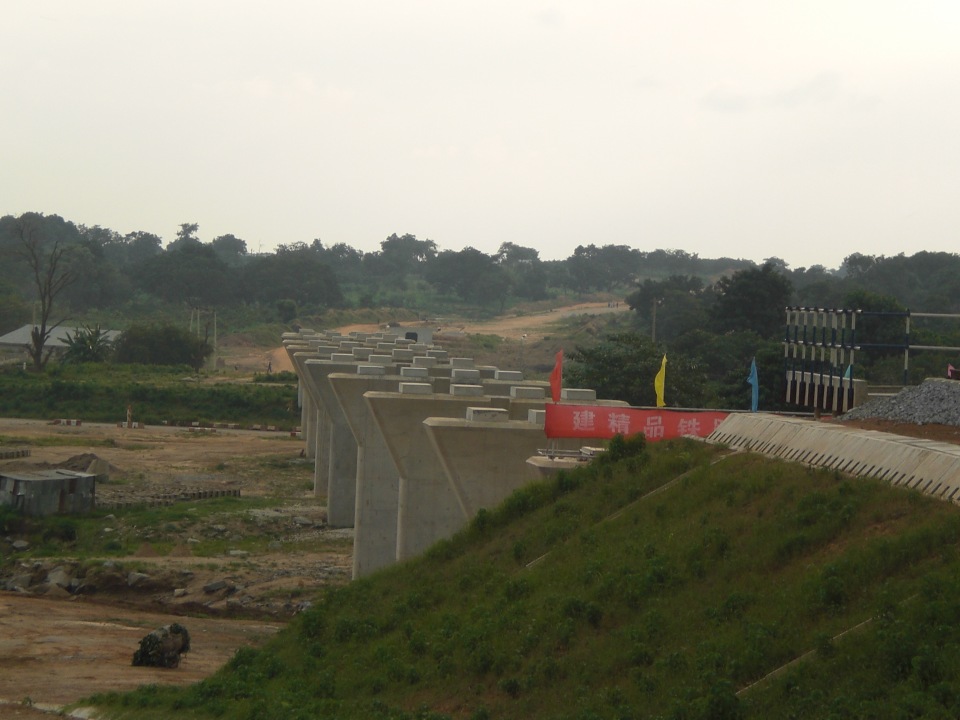 |
| CCECC Chinese Firm construction of a light rail transport system in Abuja, Nigeria. Photo taken by Author 7/25/2011. |
The American response the same year was two-pronged. Domestically, the Federal Reserve Bank of San Francisco released a report announcing “goods and services from China accounted for only 2.7% of U.S. personal consumption expenditures in 2010… Chinese imports still make up only a small share of total U.S. consumer spending.” Internationally, high level American governmental officials, as well as their British and German counterparts, namely Hillary Clinton, David Cameron and Angela Merkel, worked hard to establish strategic partnerships with African states, including Nigeria, where I conducted research into growing Sino-African relations.
In the space of a few short years, Chinese investments and trade with Africa has grown exponentially, and Chinese companies are winning contracts away from American and Western competitors. Another scramble for Africa has begun, but this time with different actors.
The failure of the Washington Consensus and structural adjustment programs to improve African economies, shepherded the entrance of the Chinese, for it was these policies that opened African markets. Free trade, macroeconomic stability, and privatization did arguably very little to drive economic growth; they instead opened up African economies to influence, manipulation and exploitation by dominant parties.
Free trade meant that African products could not compete against western competitors which, shielded by subsidies and protectionism, could be offered at lower prices. Privatization served to bring about the ruination of attempts towards industries of scale; young industries in Africa were all too quickly without a safety net, and in the hands of over-eager and inept parties that mismanaged resources.
Industrial and economic progress did more than come to a grinding halt; it regressed. The elite became even more entrenched as strongmen, and together with outside actors, plundered and raped their countries, as the world stood by. This was what China entered into, a continent where most foreigners could be framed as exploiters and thieves. To pretend that China is the savior of Africa is to be naïve, but China is no worse than the rest, and today’s heartbreaking Africa is in part the making of the West.
Africans are increasingly choosing to engage with China and this, I would argue, is not due to Chinese efforts towards infrastructure development, aid or even economic growth. Yes, Chinese efforts to construct roads, railways and hydro-electric power plants are pertinent to African development, as are Chinese aid in agricultural development, healthcare and education. Chinese interests in African commodities have increased market prices, resulting in economic growth, while cheap Chinese imports have increased the buying power of the average African.
China’s greatest contribution to Africa is even more significant than all this. Engagement with China has afforded Africa a new sense of self-determination. Chinese presence as an alternative to the West, has allowed African actors a place at the table, a say in the determination of their future.
To think of the Chinese foray into Africa and increasing influence as a zero-sum game is to lose sight of the real opportunities that engagement with China now affords many African states. The argument can be made that increasing Chinese engagement on the African continent can have a limiting effect on western influence. However, to make such an argument stick, one must dismiss Africa’s history with the West. The West is an international actor that Africa knows, and shares a history—one from which it is not easily removed. The question is then not about East versus West in Africa but rather about Africans’ attempts to decide for themselves, to be active participants in the pursuit of their own best interests.
The entry of the Chinese does not magically herald the dawning of a new day for Africa. There is still much to be done for Africa. A major hindrance to development has been African complacency and dependence on outside actors. So before making the same mistake, note that, 1) China is not the solution to Africa’s developmental challenges and 2) China, like the West, is in Africa to further China’s own interests.
Following the logic of James F. Lincoln’s thoughts on competition, it is clear that the entry of China into Africa has set the stage for competition for African resources and markets. Competition is good for all, the Chinese, the West and Africa. It reinforces the foundations for human development, and ignites the furnace of progress. Competition in Africa means that there will be winners and losers; it portends the disappearance of the lazy and incompetent, leaving behind the skilled and talented.
The development of strategic partnerships between African states and western entities reiterates the fact that the introduction of the Chinese has provided African states with a new leverage, a coming of age, an embracement of their sovereignty. So should western states then be afraid of China in Africa? On the contrary, what should drive policymaking is the development of this new Africa, a self-aware, self-promoting, and self-determined Africa.
————————–
For the record I do not consider myself a dragon-slayer or a panda-hugger, but instead an Africanist motivated by the potential for African growth and development that acknowledges that there are many challenges from internal and external actors and conditions that can and do impede the region.
No comments:
Post a Comment